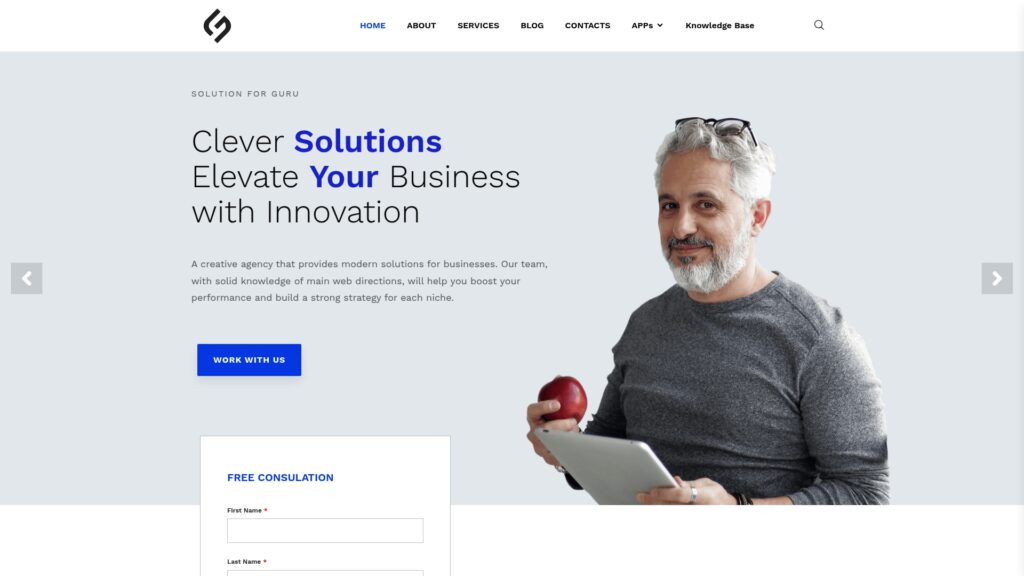How Can CRM System Proficiency Transform Your Business Success?

In today’s competitive business landscape, mastering customer relationship management systems has become essential for organizations aiming to streamline operations, enhance customer satisfaction, and drive sustainable growth. Consequently, understanding and developing CRM system proficiency can be the difference between thriving in your market and falling behind competitors.
Table of Contents
- Quick Summary
- What Is CRM System Proficiency and Why Does It Matter?
- What Are the Core Components of CRM System Proficiency?
- How Does CRM Proficiency Benefit Your Organization?
- What Skills Are Required for CRM System Proficiency?
- Which CRM Platforms Should You Master?
- How Can You Implement Effective CRM Training Programs?
- What Are the Best Practices for Maintaining CRM Proficiency?
- Summing up
- Frequently Asked Questions
- Benefits of Cooperation with Solution for Guru
Quick Summary
CRM system proficiency represents the comprehensive ability to effectively utilize customer relationship management platforms to optimize business processes, enhance customer interactions, and drive organizational growth. This guide explores the essential components of CRM proficiency, including technical skills, strategic implementation, and best practices across leading platforms such as Pipedrive CRM, Salesforce CRM, Zoho CRM, Creatio CRM, and Bigin by Zoho CRM. Furthermore, we examine how organizations can develop, measure, and maintain CRM expertise while overcoming common challenges. Ultimately, mastering CRM systems empowers businesses to make data-driven decisions, improve customer retention, and achieve sustainable competitive advantages in their respective markets.
What Is CRM System Proficiency and Why Does It Matter?
CRM system proficiency refers to the comprehensive knowledge, skills, and practical abilities required to effectively utilize customer relationship management software to its fullest potential. Essentially, it encompasses understanding the technical aspects of CRM platforms, strategic application of CRM functionalities, and the ability to translate system capabilities into tangible business outcomes. Moreover, proficiency extends beyond basic data entry to include advanced features such as automation, analytics, integration, and customization.
In the modern business environment, CRM proficiency matters significantly because customer data has become one of the most valuable assets organizations possess. Companies that effectively leverage their CRM systems can gain deeper insights into customer behavior, preferences, and needs. Consequently, this understanding enables businesses to personalize their approach, anticipate customer requirements, and deliver exceptional experiences that foster loyalty and retention.
Additionally, CRM proficiency directly impacts operational efficiency and productivity across multiple departments. When teams are skilled in using CRM platforms like Salesforce CRM or Pipedrive CRM, they can automate repetitive tasks, streamline workflows, and reduce manual errors. Therefore, employees can focus their energy on high-value activities such as building relationships, closing deals, and developing strategic initiatives rather than getting bogged down in administrative tasks.
Furthermore, organizations with high levels of CRM proficiency tend to make better data-driven decisions. These systems collect vast amounts of information about customer interactions, sales patterns, and market trends. However, this data only becomes actionable when users possess the skills to analyze, interpret, and apply these insights effectively. Thus, CRM proficiency transforms raw data into strategic intelligence that guides business direction.
What Are the Core Components of CRM System Proficiency?
How Does Technical Knowledge Form the Foundation?
Technical knowledge represents the fundamental building block of CRM proficiency. Initially, users must understand the system’s architecture, navigation, and basic functionalities. This includes knowing how to create and manage records, update contact information, log activities, and generate basic reports. Moreover, technical proficiency extends to understanding data structures, field types, and how information flows through the system.
Advanced technical knowledge involves mastering automation tools, custom field creation, workflow configuration, and API integrations. For instance, Zoho CRM offers extensive customization capabilities that allow businesses to tailor the system to their specific needs. Similarly, Creatio CRM provides low-code development tools that enable users to build custom applications without extensive programming knowledge. Therefore, technical proficiency at this level empowers organizations to transform their CRM from a standard tool into a customized solution.
Why Is Strategic Application Essential?
Strategic application represents the ability to align CRM capabilities with business objectives and customer strategies. Rather than simply using the system as a database, proficient users leverage CRM platforms to support specific business goals such as increasing conversion rates, improving customer satisfaction, or expanding into new markets. Consequently, this requires understanding how different CRM features contribute to overarching organizational strategies.
For example, Bigin by Zoho CRM is specifically designed for small businesses and startups, offering streamlined features that support focused growth strategies. Conversely, Salesforce CRM provides enterprise-level capabilities suitable for complex, multi-departmental strategies. Therefore, strategic proficiency involves selecting the right tools for specific objectives and implementing them in ways that maximize business impact.
How Does Data Management Excellence Contribute?
Data management excellence encompasses the skills required to maintain data quality, integrity, and security within CRM systems. Proficient users understand the importance of consistent data entry standards, regular data cleansing, and duplicate prevention. Moreover, they implement validation rules, mandatory fields, and data governance policies that ensure information remains accurate and reliable over time.
Furthermore, data management proficiency includes understanding data privacy regulations such as GDPR and CCPA, and implementing appropriate security measures. Platforms like Pipedrive CRM offer robust security features and compliance tools that help organizations protect sensitive customer information. Thus, proficient users can balance accessibility with security, ensuring that team members have the information they need while maintaining appropriate safeguards.
| Component | Description | Impact on Business |
|---|---|---|
| Technical Knowledge | Understanding system architecture, navigation, and functionalities | Enables efficient daily operations and system utilization |
| Strategic Application | Aligning CRM capabilities with business objectives | Maximizes ROI and supports organizational goals |
| Data Management | Maintaining data quality, integrity, and security | Ensures reliable insights and compliance |
| Analytical Skills | Interpreting data and generating actionable insights | Drives data-driven decision making |
| Integration Expertise | Connecting CRM with other business systems | Creates unified technology ecosystem |
How Does CRM Proficiency Benefit Your Organization?

What Impact Does It Have on Sales Performance?
CRM proficiency significantly enhances sales performance by providing sales teams with comprehensive tools to manage their pipelines effectively. When sales professionals are proficient in platforms like Pipedrive CRM, they can visualize their entire sales process, identify bottlenecks, and prioritize high-value opportunities. Additionally, automated reminders and follow-up suggestions ensure that no potential deal falls through the cracks due to oversight.
Moreover, proficient use of CRM analytics enables sales managers to forecast revenue more accurately, identify top performers, and replicate successful strategies across the team. Salesforce CRM, for instance, offers advanced forecasting tools and AI-powered insights that help sales leaders make informed decisions about resource allocation and strategy adjustments. Consequently, organizations with high CRM proficiency typically experience shorter sales cycles, higher conversion rates, and increased revenue per sales representative.
How Does It Improve Customer Service and Satisfaction?
Customer service excellence relies heavily on having complete, accessible information about customer history, preferences, and previous interactions. CRM proficiency ensures that service teams can quickly retrieve this information and provide personalized, contextual support. Furthermore, integrated ticketing systems and case management features in platforms like Zoho CRM enable efficient issue resolution and proactive customer engagement.
Additionally, proficient CRM users can identify patterns in customer complaints or inquiries, enabling organizations to address systemic issues before they escalate. Creatio CRM’s service management capabilities allow teams to track service level agreements, monitor response times, and ensure consistent service quality. Therefore, CRM proficiency translates directly into higher customer satisfaction scores, improved retention rates, and increased customer lifetime value.
Why Does It Matter for Marketing Effectiveness?
Marketing proficiency in CRM systems enables teams to segment audiences precisely, personalize campaigns effectively, and measure marketing ROI accurately. When marketing professionals understand how to leverage CRM data, they can create highly targeted campaigns that resonate with specific customer segments. Moreover, integration between CRM and marketing automation tools allows for sophisticated lead nurturing workflows that guide prospects through the buyer’s journey efficiently.
Platforms like Bigin by Zoho CRM provide marketing teams with essential tools to track campaign performance, attribute leads to specific marketing activities, and optimize their strategies based on data-driven insights. Similarly, Salesforce CRM’s Marketing Cloud offers enterprise-level marketing automation that connects every customer interaction across channels. Consequently, CRM proficiency empowers marketing teams to demonstrate their value, justify their budgets, and continuously improve their effectiveness.
What Skills Are Required for CRM System Proficiency?
Which Technical Skills Should You Develop?
Developing technical CRM skills begins with mastering the user interface and core functionalities of your chosen platform. Initially, users should become comfortable with record creation, data entry, search functions, and basic reporting. Subsequently, advancing to intermediate skills involves learning about custom fields, list views, filters, and basic automation rules. Eventually, advanced technical proficiency includes API integration, custom object creation, advanced workflow design, and system administration.
For specific platforms, technical requirements vary somewhat. Pipedrive CRM emphasizes visual pipeline management and deal tracking, requiring users to understand stages, activities, and revenue forecasting. Conversely, Salesforce CRM demands more comprehensive technical knowledge due to its extensive feature set, including Apex code, Visualforce pages, and Lightning components. Meanwhile, Zoho CRM balances complexity with accessibility, offering both user-friendly interfaces and powerful customization options for technical users.
How Important Are Analytical and Problem-Solving Abilities?
Analytical skills are crucial for transforming CRM data into actionable business intelligence. Proficient users must understand how to design meaningful reports, interpret dashboard metrics, and identify trends within customer data. Furthermore, they need to ask the right questions of their data and understand which metrics truly matter for their business objectives rather than getting distracted by vanity metrics.
Problem-solving abilities complement analytical skills by enabling users to diagnose issues, optimize processes, and overcome implementation challenges. For example, when adoption rates are low, proficient users can analyze usage patterns, identify barriers, and implement solutions such as simplified workflows or targeted training. Additionally, problem-solving skills help users customize CRM systems like Creatio CRM to address unique business challenges that standard configurations don’t fully resolve.
Why Do Communication and Training Skills Matter?
Communication skills are essential because CRM proficiency needs to spread throughout the organization to be truly effective. CRM champions must be able to explain complex features in accessible terms, demonstrate value to skeptical users, and advocate for best practices across departments. Moreover, they need to gather feedback from users, communicate requirements to administrators, and ensure that the system evolves to meet changing business needs.
Training skills enable proficient users to elevate the capabilities of their entire organization. Whether creating documentation, conducting workshops, or providing one-on-one coaching, effective trainers can accelerate organizational CRM adoption. Platforms like Bigin by Zoho CRM benefit particularly from strong training initiatives because their simplicity makes them ideal for teams new to CRM systems. Therefore, communication and training skills multiply the impact of individual proficiency across the entire organization.
- Data Analysis: Ability to interpret reports, dashboards, and metrics to derive business insights
- Process Optimization: Skills in identifying inefficiencies and redesigning workflows for better outcomes
- System Configuration: Knowledge of customizing CRM settings, fields, and features to match business needs
- Integration Management: Understanding how to connect CRM with other business applications
- User Training: Capability to educate team members and promote adoption throughout the organization
- Strategic Thinking: Ability to align CRM capabilities with broader business objectives
- Change Management: Skills in guiding organizations through CRM implementations and upgrades
Which CRM Platforms Should You Master?
Why Is Salesforce CRM Considered the Industry Leader?

Salesforce CRM has established itself as the dominant force in customer relationship management, serving organizations from small businesses to Fortune 500 enterprises. Its comprehensive feature set covers sales, service, marketing, commerce, and analytics, making it a complete customer engagement platform. Moreover, Salesforce’s extensive ecosystem includes thousands of third-party integrations and a vast marketplace of specialized applications that extend its functionality virtually infinitely.
The platform’s strength lies in its scalability and customization capabilities. Organizations can start with basic sales tracking and gradually expand to include sophisticated features like AI-powered insights through Einstein Analytics, complex automation through Flow Builder, and custom application development through Lightning Platform. Furthermore, Salesforce’s regular updates and commitment to innovation ensure that users always have access to cutting-edge CRM technology. However, this power comes with complexity, requiring significant investment in training and potentially dedicated administrators to maximize its value.
How Does Pipedrive CRM Simplify Sales Management?

Pipedrive CRM distinguishes itself through its intuitive, visual approach to sales pipeline management. Designed specifically for sales teams, it emphasizes simplicity and usability without sacrificing essential functionality. The platform’s visual pipeline view allows sales representatives to understand their deals at a glance, drag and drop opportunities between stages, and focus on the activities that actually move deals forward. Consequently, Pipedrive has become particularly popular among small to medium-sized businesses that need powerful sales tools without overwhelming complexity.
Additionally, Pipedrive excels at activity-based selling, encouraging sales teams to focus on actions rather than just outcomes. Its AI-powered Sales Assistant provides personalized recommendations, identifies potential issues, and suggests next steps based on historical data. Moreover, Pipedrive’s mobile application ensures that sales professionals can access critical information and update records from anywhere, maintaining productivity even when away from their desks. Therefore, organizations prioritizing sales effectiveness and user adoption often find Pipedrive to be an ideal solution.
What Makes Zoho CRM Attractive for Growing Businesses?

Zoho CRM offers an impressive balance between affordability, functionality, and ease of use, making it particularly attractive for growing businesses. As part of the broader Zoho ecosystem, it integrates seamlessly with other Zoho applications including Zoho Books for accounting, Zoho Campaigns for email marketing, and Zoho Desk for customer support. This integration creates a unified business management platform that eliminates data silos and provides comprehensive visibility across all customer-facing functions.
The platform provides extensive customization options through its Blueprint feature, which allows businesses to design and enforce complex business processes without coding. Furthermore, Zoho CRM’s AI assistant, Zia, offers intelligent predictions, anomaly detection, and conversational assistance that enhance user productivity. Additionally, Zoho’s pricing model remains competitive while offering generous feature sets even at lower tiers, enabling businesses to access sophisticated CRM capabilities without enterprise-level budgets. Consequently, many organizations find Zoho CRM provides exceptional value as they scale their operations.
How Does Creatio CRM Support Process Automation?

Creatio CRM differentiates itself through its emphasis on process automation and low-code development capabilities. Built on a unified platform that combines CRM, business process management, and low-code development, Creatio enables organizations to automate complex workflows across departments. Its visual process designer allows business users to create sophisticated automation without extensive technical knowledge, democratizing the ability to optimize operations.
Moreover, Creatio’s approach to CRM extends beyond traditional customer management to encompass end-to-end business processes. Organizations can model, execute, and continuously optimize processes spanning marketing, sales, and service. The platform’s AI and machine learning capabilities provide intelligent recommendations, predictive analytics, and process optimization suggestions. Therefore, businesses seeking to transform their operations through digital automation often find Creatio to be a powerful enabler of business transformation beyond basic CRM functionality.
When Should You Consider Bigin by Zoho CRM?

Bigin by Zoho CRM specifically targets small businesses, startups, and teams that need essential CRM functionality without the complexity of full-featured platforms. It focuses on pipeline management, contact organization, and basic automation, presenting these features in an accessible, easy-to-learn interface. Unlike comprehensive platforms that can overwhelm new users, Bigin maintains simplicity while providing the core tools necessary for effective customer relationship management.
The platform’s pricing structure makes it particularly attractive for budget-conscious organizations, offering powerful features at entry-level price points. Despite its simplicity, Bigin doesn’t sacrifice essential capabilities such as workflow automation, email integration, and mobile access. Additionally, as businesses grow and their needs become more sophisticated, they can transition to Zoho CRM or other Zoho applications, maintaining their data and building on their existing foundation. Consequently, Bigin serves as an excellent starting point for organizations beginning their CRM journey or teams that prefer straightforward, focused tools over feature-rich complexity.
How Can You Implement Effective CRM Training Programs?
What Should Your Training Strategy Include?
An effective CRM training strategy must begin with a thorough needs assessment that identifies the specific skills gaps within your organization. Different user groups require different levels of proficiency—sales representatives need deep knowledge of pipeline management, customer service teams require expertise in case handling, and administrators must understand system configuration and maintenance. Therefore, developing role-specific training paths ensures that each user receives relevant instruction that directly applies to their responsibilities.
Moreover, successful training strategies incorporate multiple learning modalities to accommodate different learning preferences. This includes instructor-led workshops for interactive learning, video tutorials for visual learners, written documentation for reference, and hands-on practice in sandbox environments where users can experiment without affecting live data. Additionally, establishing clear learning objectives and measurable outcomes helps both trainers and learners track progress and identify areas requiring additional focus. Consequently, comprehensive training strategies address not just initial onboarding but ongoing skill development as platforms evolve and business needs change.
How Do You Create Engaging Training Content?
Creating engaging training content requires focusing on practical, real-world applications rather than abstract feature descriptions. Instead of explaining every button and menu option, effective training demonstrates how specific CRM features solve actual business problems. For example, when training on Pipedrive CRM‘s automation features, show how automated follow-up emails can prevent lost opportunities rather than simply explaining the automation interface. Similarly, when teaching Salesforce CRM reporting, create reports that answer real business questions your organization faces.
Furthermore, incorporating storytelling and scenarios makes training more memorable and relatable. Develop case studies that mirror your organization’s typical customer interactions, challenges, and processes. Use these narratives to illustrate how CRM proficiency enables better outcomes, faster resolutions, and improved customer satisfaction. Additionally, involving successful CRM users as guest speakers or case study subjects provides credibility and demonstrates tangible results that inspire learners. Therefore, engaging training content bridges the gap between technical knowledge and practical application, making learning both relevant and motivating.
Why Is Ongoing Support Critical After Initial Training?
Initial training provides the foundation, but ongoing support ensures that users maintain and expand their CRM proficiency over time. After formal training concludes, users inevitably encounter situations not covered in their initial instruction, face questions about advanced features, or need refreshers on infrequently used functions. Establishing accessible support channels such as help desks, internal user communities, or designated CRM champions ensures that users can get assistance when they need it without feeling abandoned after their initial training.
Moreover, ongoing support creates opportunities for continuous improvement and knowledge sharing. Regular tips newsletters, lunch-and-learn sessions, or advanced workshops keep CRM top-of-mind and expose users to features they might not discover independently. Platforms like Zoho CRM and Creatio CRM regularly introduce new features and capabilities, making ongoing education essential for maximizing value from these investments. Additionally, support mechanisms provide valuable feedback about usability challenges, training gaps, and potential system improvements. Consequently, organizations that invest in ongoing support see higher adoption rates, better data quality, and greater return on their CRM investments.
What Are the Best Practices for Maintaining CRM Proficiency?

How Often Should You Review and Update CRM Processes?
Regular process reviews are essential for maintaining CRM effectiveness as business needs evolve. Organizations should conduct comprehensive CRM audits at least quarterly, examining data quality, user adoption rates, workflow efficiency, and alignment with business objectives. These reviews identify opportunities for optimization, uncover underutilized features, and ensure that the system continues to serve organizational needs effectively. Moreover, involving users from different departments in these reviews provides diverse perspectives and helps identify pain points that administrators might not notice independently.
Additionally, establishing a formal change management process ensures that CRM updates and modifications happen systematically rather than haphazardly. Before implementing changes, evaluate their impact on different user groups, update training materials, and communicate modifications clearly to affected users. Platforms like Bigin by Zoho CRM and Pipedrive CRM make configuration changes relatively straightforward, but even simple modifications can disrupt established workflows if not properly managed. Therefore, disciplined process review and change management maintain system effectiveness while preventing the confusion that often accompanies poorly planned modifications.
What Role Does Certification Play in Professional Development?
Professional certifications validate CRM expertise and demonstrate commitment to continuous learning. Salesforce offers a comprehensive certification program spanning multiple roles including administrators, developers, consultants, and architects. These certifications require passing rigorous examinations and, in many cases, maintaining credentials through ongoing education. Similarly, other platforms like Zoho CRM and Creatio CRM provide certification programs that recognize expertise and distinguish qualified professionals in competitive job markets.
Beyond individual career benefits, certifications benefit organizations by ensuring that their CRM teams possess verified expertise. Certified professionals bring best practices, stay current with platform developments, and can leverage advanced features more effectively. Furthermore, certification programs often provide access to exclusive resources, communities, and support that enhance problem-solving capabilities. Therefore, encouraging and supporting certification pursuits creates a culture of excellence and continuous improvement around CRM proficiency.
How Can You Foster a Culture of CRM Excellence?
Creating a culture of CRM excellence requires leadership commitment, clear expectations, and visible recognition of proficiency. When executives actively use CRM systems, reference CRM data in decision-making, and demonstrate their own commitment to data quality, they send powerful messages about the system’s importance. Moreover, establishing CRM proficiency as a performance expectation rather than an optional skill ensures that users take their development seriously and understand that proficiency impacts their professional success.
Recognition programs that celebrate CRM champions, innovative uses, and data quality achievements reinforce positive behaviors and motivate continuous improvement. Sharing success stories about how CRM proficiency enabled business wins, solved customer problems, or improved efficiency demonstrates tangible value and inspires others to develop their skills. Additionally, creating forums for users to share tips, ask questions, and learn from each other builds community and distributes knowledge throughout the organization. Consequently, organizations that foster cultures of CRM excellence achieve higher adoption, better data quality, and greater returns on their technology investments.
Summing up
Throughout this comprehensive exploration of CRM system proficiency, we have established that mastering customer relationship management platforms represents far more than technical skill acquisition – it embodies a strategic capability that fundamentally transforms how organizations engage with customers, optimize operations, and drive sustainable growth. The journey toward CRM excellence requires commitment to continuous learning, strategic implementation, and cultural transformation that values data-driven decision-making and customer-centric approaches.
Ultimately, CRM proficiency transcends platform selection to encompass organizational culture, continuous learning commitment, and strategic alignment between technology capabilities and business objectives. Organizations that invest in comprehensive training programs, establish clear proficiency standards, provide ongoing support, and foster cultures of excellence realize dramatically higher returns on their CRM investments. These organizations transform customer data into strategic intelligence, automate repetitive tasks to focus on high-value activities, and create exceptional customer experiences that drive loyalty and growth.
The challenges inherent in building and maintaining CRM proficiency—including user resistance, technical complexity, and momentum maintenance—are substantial but surmountable through patient, systematic approaches. Success requires acknowledging these challenges openly, addressing root causes empathetically, and maintaining persistent focus on the ultimate goal of organizational transformation. Moreover, measuring proficiency through comprehensive metrics that span usage, data quality, business outcomes, and demonstrated competency ensures that development initiatives remain targeted and effective.
As businesses navigate increasingly competitive markets and rising customer expectations, CRM proficiency will only grow in strategic importance. Organizations that prioritize this capability position themselves to leverage emerging technologies such as artificial intelligence, predictive analytics, and advanced automation. Therefore, whether your organization selects Salesforce CRM for enterprise scale, Pipedrive CRM for sales simplicity, Zoho CRM for balanced value, Creatio CRM for process automation, or Bigin by Zoho CRM for accessible beginnings, the commitment to building genuine proficiency determines ultimate success far more than platform selection alone.
Frequently Asked Questions
The timeline for achieving CRM proficiency varies significantly based on the platform’s complexity, the user’s technical background, and the depth of proficiency required. For basic proficiency in user-friendly platforms like Bigin by Zoho CRM or Pipedrive CRM, users can typically achieve functional competence within 2-4 weeks of regular use and structured training. However, intermediate proficiency involving customization, automation, and advanced reporting generally requires 3-6 months of consistent application and ongoing learning.
For comprehensive platforms like Salesforce CRM or Creatio CRM, achieving advanced proficiency can take 6-12 months or longer, particularly when pursuing specialized roles such as system administration or development. Moreover, true expertise that encompasses strategic application, complex integrations, and organizational change management often develops over years of dedicated practice.
Absolutely—small businesses can achieve excellent CRM proficiency, often with advantages that larger organizations lack. Small businesses typically have shorter decision-making cycles, more direct communication channels, and greater organizational agility that facilitates rapid adoption and adaptation. Moreover, platforms specifically designed for small businesses, such as Bigin by Zoho CRM and Pipedrive CRM, provide focused functionality that matches their needs without enterprise-level complexity, making proficiency more achievable.
In fact, small businesses often achieve higher user adoption rates and more consistent data quality because they can implement more cohesive training programs and maintain better oversight of system usage. Furthermore, small business teams frequently demonstrate greater flexibility in adapting workflows to optimize CRM effectiveness. While large enterprises may have access to more specialized resources and training budgets, small businesses can leverage their agility, focus, and team cohesion to achieve impressive proficiency levels.
Why Should You Partner with Solution for Guru for Your CRM Journey?
Developing comprehensive CRM proficiency represents a significant undertaking that can overwhelm organizations attempting to navigate this journey independently. Solution for Guru (https://www.solution4guru.com/) specializes in guiding businesses through every stage of CRM implementation, optimization, and proficiency development, transforming what could be a challenging process into a smooth, strategic advancement of organizational capabilities.
Organizations across all sizes and industries benefit from Solution for Guru’s expertise, though particular scenarios create especially valuable partnerships. Companies implementing CRM for the first time avoid costly mistakes and achieve success faster with expert guidance. Organizations struggling with underperforming existing CRM systems can revitalize their implementations through Solution for Guru’s diagnostic and optimization services. Additionally, businesses planning platform migrations minimize risk and disruption through structured transition support.

Furthermore, growing companies scaling their operations find Solution for Guru’s strategic guidance invaluable for ensuring their CRM capabilities keep pace with expanding requirements. Whether you’re a small business starting with Bigin by Zoho CRM, a mid-sized company optimizing Pipedrive CRM or Zoho CRM, or an enterprise leveraging Salesforce CRM or Creatio CRM, Solution for Guru’s tailored approach addresses your unique circumstances while bringing world-class expertise to your specific challenges.
Ultimately, partnering with Solution for Guru represents an investment in accelerated success, reduced risk, and sustained competitive advantage through CRM excellence. Their proven methodologies, comprehensive expertise, and commitment to client success transform CRM proficiency from a daunting challenge into an achievable strategic capability that drives measurable business results.




